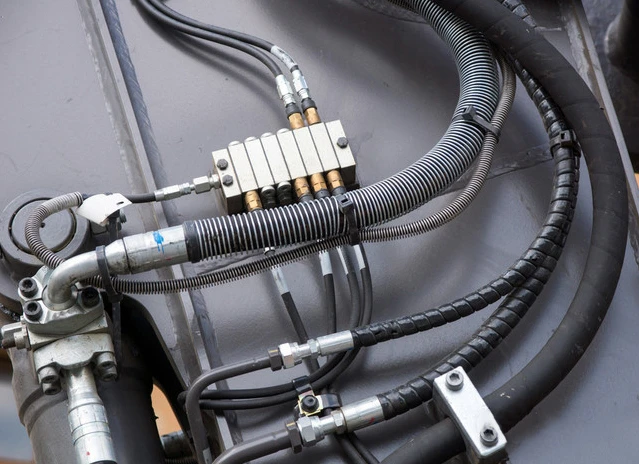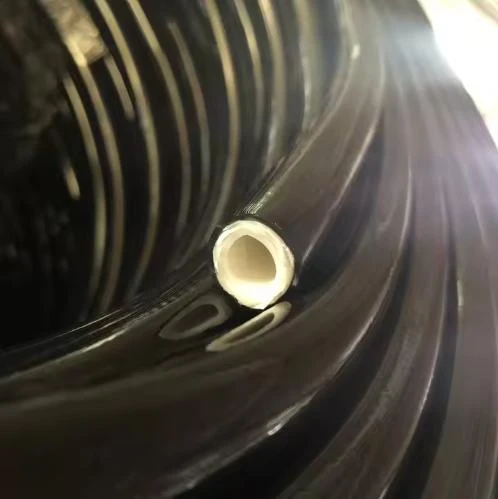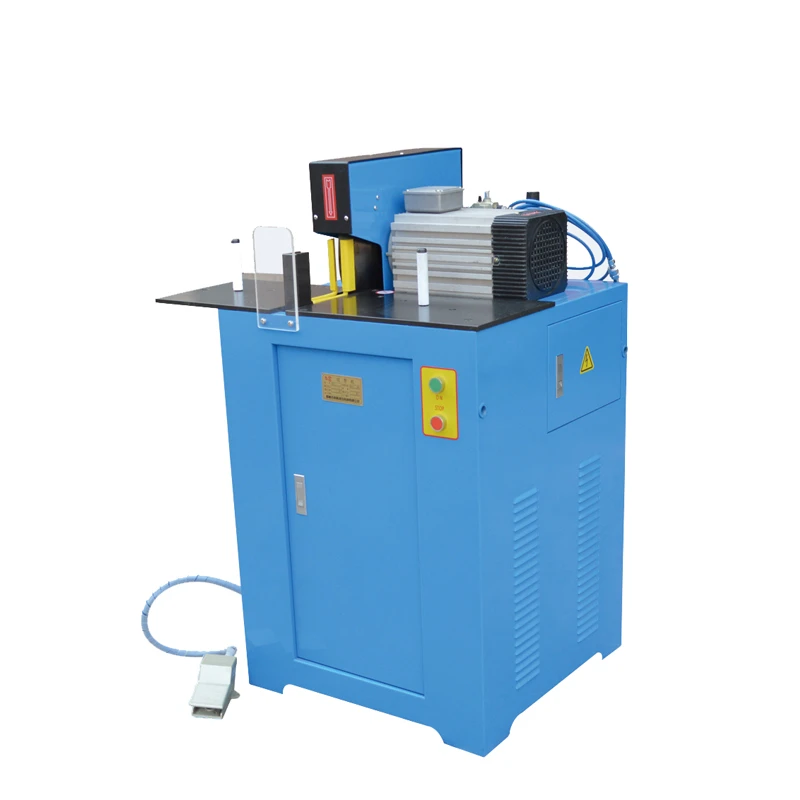Tubo chimico
Un tubo chimico è un tipo di tubo specificamente progettato per trasportare in modo sicuro un'ampia gamma di sostanze chimiche, tra cui acidi, alcali, solventi, oli e altri liquidi pericolosi o aggressivi. Questi tubi sono realizzati con materiali resistenti alla corrosione, all'attacco chimico e all'abrasione per garantire un funzionamento sicuro ed efficace. Il rivestimento interno di un tubo chimico è in genere realizzato in gomma sintetica, PTFE (Teflon) o altri composti specializzati che forniscono un elevato livello di resistenza a una varietà di sostanze chimiche. La copertura esterna è spesso rinforzata con filo di acciaio intrecciato o strati tessili per aumentare la resistenza e fornire protezione dai danni meccanici. I tubi chimici sono utilizzati in numerosi settori, tra cui la produzione chimica, farmaceutica, agricola, petrolifera e del gas e la produzione alimentare, dove è richiesto il trasferimento di materiali pericolosi o altamente reattivi. Ad esempio, nell'industria chimica, questi tubi sono utilizzati per trasferire sostanze chimiche industriali tra serbatoi e apparecchiature di lavorazione, mentre in agricoltura, sono utilizzati per spruzzare pesticidi e fertilizzanti. I tubi chimici sono utilizzati anche per il trasporto di carburante e lubrificanti nell'industria petrolifera e del gas. La loro capacità di resistere alla degradazione chimica, alla pressione e alle alte temperature li rende indispensabili nelle applicazioni in cui sicurezza e affidabilità sono fondamentali.
Quali fattori bisogna considerare quando si sceglie un tubo per sostanze chimiche?
Quando si seleziona un tubo chimico, è essenziale considerare diversi fattori chiave per garantire che questo tubo chimico sia adatto all'applicazione specifica. Il primo fattore da valutare è la compatibilità del materiale del tubo con le sostanze chimiche trasportate. Sostanze chimiche diverse possono causare diversi livelli di degradazione dei materiali del tubo, quindi è fondamentale scegliere un tubo resistente alle sostanze chimiche realizzato con materiali resistenti ai tipi chimici specifici coinvolti. I materiali comuni per i tubi chimici, come i tubi in gomma chimica, includono gomme sintetiche (come EPDM e nitrile), PTFE e polietilene, che offrono un'eccellente resistenza chimica.
Un altro fattore importante è la pressione nominale del tubo chimico. Per i sistemi con requisiti di alta pressione, è necessario selezionare un tubo chimico ad alta pressione, in quanto deve gestire la pressione del sistema senza rompersi. Inoltre, l'intervallo di temperatura è fondamentale, poiché alcuni prodotti chimici potrebbero dover essere trasferiti a temperature elevate o basse attraverso il tubo chimico.
La flessibilità è un altro fattore importante da considerare, in particolare per i tubi flessibili chimici utilizzati in sistemi che richiedono movimenti o piegature frequenti. Anche la lunghezza e il diametro del tubo devono essere selezionati in base ai requisiti del sistema per garantire un flusso adeguato ed evitare perdite di pressione non necessarie. Rinforzi come filo di acciaio intrecciato o filo di acciaio a spirale vengono aggiunti per aumentare la resistenza del tubo chimico e impedire attorcigliamenti o collassi.
Infine, assicurati che il tubo chimico soddisfi gli standard e le certificazioni del settore pertinenti, come quelli stabiliti dagli standard FDA, ISO o EN, per garantire che sia sicuro per l'uso in applicazioni specifiche. Considerando questi fattori, puoi selezionare un tubo chimico che fornisca un servizio sicuro e affidabile nel tempo.
Quali materiali vengono comunemente utilizzati per costruire tubi flessibili chimici e perché sono adatti?
I tubi chimici sono realizzati con materiali scelti per la loro resistenza all'ampia gamma di sostanze chimiche e alle condizioni difficili che possono incontrare nelle applicazioni industriali e commerciali. Uno dei materiali più comunemente usati per i tubi chimici è la gomma sintetica, come l'EPDM (etilene propilene diene monomero), che offre un'eccellente resistenza ad acidi, alcali e agenti atmosferici. Anche la gomma nitrilica è comunemente usata per la sua resistenza a oli, carburanti e solventi, rendendola ideale per il trasporto di prodotti petroliferi o sostanze chimiche pericolose. Il PTFE (Teflon) è un altro materiale popolare per i tubi chimici grazie alla sua natura non reattiva e alla sua resistenza a un'ampia varietà di sostanze chimiche aggressive e alle alte temperature. I tubi in PTFE sono particolarmente adatti per il trasferimento di acidi forti, sostanze caustiche e solventi che possono scomporre altri materiali. Inoltre, il polietilene è usato in alcune applicazioni per la sua resistenza chimica e flessibilità, in particolare nei tubi chimici agricoli e alimentari. Per aumentare la durata e la resistenza, i tubi chimici sono spesso rinforzati con strati di filo di acciaio o treccia tessile. Questi rinforzi impediscono al tubo di collassare sotto pressione, assicurano flessibilità e forniscono protezione contro danni meccanici esterni. La combinazione di questi materiali garantisce che i tubi chimici possano gestire in modo sicuro e affidabile le sostanze aggressive per cui sono stati progettati, mantenendo flessibilità e durata in ambienti difficili.
Decoding the Corrosion-Resistant Core of Chemical Hoses: Material Science and Engineering Design
SINOPULSE combines advanced material science with precision engineering to create flexible chemical hoses that excel in transporting aggressive fluids. The ability to resist corrosion hinges on carefully selected inner tube materials, reinforced structures, and protective layers—each element designed to withstand specific chemical challenges. Let’s explore the technical foundations that make SINOPULSE chemical-resistant hoses the trusted choice for demanding industrial applications.
1. Fluoropolymer Liners: The First Line of Defense
At the heart of SINOPULSE chemical transfer hoses lies a fluoropolymer inner tube, typically PTFE (Polytetrafluoroethylene) or FEP (Fluorinated Ethylene Propylene). These materials owe their exceptional corrosion resistance to a unique molecular structure: a tightly packed carbon-fluorine bond (C-F) that is one of the strongest in polymer chemistry. This bond resists breakage from strong acid (e.g., sulfuric acid), strong base (e.g., sodium hydroxide), and solvents (e.g., acetone), making PTFE-lined hoses compatible with over 98% of industrial chemicals. For example, in pharmaceutical manufacturing, PTFE-lined hoses safely transport concentrated hydrochloric acid without swelling or degradation, maintaining fluid purity and hose integrity over years of use.
2. Elastomeric Compounds for Specialized Chemistries
When applications demand flexibility at lower temperatures or resistance to specific chemical families, SINOPULSE employs high-performance elastomers like fluoroelastomer (FKM) or ethylene-propylene-diene monomer (EPDM). FKM, with its cross-linked fluorocarbon structure, excels in resisting petroleum-based solvents and high-temperature oxidizers, making it ideal for aerospace hydraulic fluids. EPDM, conversely, thrives in aqueous environments, providing superior resistance to ketones and steam—critical for wastewater treatment systems where dilute acids and alkalis are common. These materials undergo rigorous swelling tests (e.g., ≤0.5% volume change in ASTM D471) to ensure long-term reliability.
3. Reinforcement Layers: Structural Integrity Under Pressure
Even the most corrosion-resistant liners require robust support to handle high-pressure applications. SINOPULSE high-pressure chemical hoses integrate braided or spiral-wound reinforcement layers, such as stainless steel wire or aramid fibers, to distribute internal pressure evenly. A 304 stainless steel braid, for instance, adds mechanical strength capable of withstanding 500 bar (7250 PSI) burst pressure while remaining non-reactive to most chemicals. This design prevents liner collapse or delamination, ensuring safe fluid transfer in refinery pipelines or chemical reactor feed systems.
4. Protective Outer Covers: Shielding Against External Threats
The outer layer of SINOPULSE chemical hoses is engineered to protect against external hazards like abrasion, UV radiation, and physical impact. Polyurethane (PU) or chloroprene rubber covers offer excellent resistance to cutting and weathering, vital for outdoor chemical transfer in mining or offshore platforms. For static-sensitive environments, anti-static additives in the outer layer dissipate electrical charges, eliminating ignition risks when handling flammable solvents like methanol.
Engineered for Synergy: How Layers Work Together
The true power of SINOPULSE chemical-resistant hoses lies in the synergy between layers: the fluoropolymer liner repels chemical attack, the reinforcement layer maintains structural stability, and the outer cover shields against environmental damage. This tri-layer system undergoes rigorous testing, including permeation resistance (ASTM F739) to ensure minimal chemical leakage and thermal cycling to validate performance across extreme temperatures.
In industries where chemical compatibility and safety are non-negotiable—from petrochemical processing to semiconductor manufacturing—SINOPULSE’s material expertise and engineering precision deliver chemical hoses that redefine corrosion resistance. Trust our solutions to protect your processes, people, and profits, no matter how aggressive the fluid.
Precision Fluid Transfer: The Stringent Demands of High-Purity Chemical Hoses in Semiconductor and Pharmaceutical Industries
In the semiconductor and pharmaceutical sectors, where precision and purity are non-negotiable, SINOPULSE, a leading chemical hose manufacturer, rises to the challenge with specialized high-purity chemical hoses. These industries demand hoses that not only resist corrosion but also maintain the integrity of ultra-sensitive fluids, and SINOPULSE’s engineered solutions meet these exacting standards.
Purity as the Cornerstone
Semiconductor manufacturing, particularly in wafer fabrication, relies on highly corrosive etching agents and ultra-pure water. SINOPULSE’s flexible chemical hoses feature smooth-bore EPDM liners. In pharmaceutical production, where drug safety is paramount, our hoses comply with FDA and USP Class VI standards, guaranteeing that no chemical residues leach into medications during transfer. For instance, when transporting sterile solutions for injectable drugs, SINOPULSE chemical transfer hoses maintain the fluid’s sterility throughout the process.
Controlled Environment Compatibility
Both industries operate in tightly controlled environments. Semiconductor facilities require hoses that can withstand rapid temperature fluctuations during plasma etching and annealing processes. SINOPULSE’s high-purity chemical hoses, reinforced with inert materials like stainless steel braids, retain their structural integrity under extreme conditions without reacting with aggressive chemicals. In pharmaceutical cleanrooms, where particulate matter is strictly monitored, our hoses are designed to prevent outgassing, ensuring that volatile compounds do not compromise air quality or product purity.
High-Pressure Performance with Precision
Semiconductor wet processing and pharmaceutical synthesis often involve high-pressure fluid delivery. SINOPULSE high-pressure chemical hoses are engineered to handle pressures up to 500 bar (7250 PSI) while maintaining precision flow control. The multi-layer construction, combining a corrosion-resistant fluoropolymer inner tube with a robust reinforcement layer, ensures consistent performance without leaks or pressure drops. This reliability is crucial in semiconductor lithography, where even a minor fluid deviation can render an entire wafer batch defective.
Compliance Beyond Standards
SINOPULSE understands that these industries operate under strict regulatory frameworks. Our chemical-resistant hoses undergo rigorous testing, including biocompatibility evaluations and permeation resistance assessments, to meet international guidelines. Whether it’s safeguarding the purity of semiconductor-grade chemicals or ensuring the safety of pharmaceutical formulations, SINOPULSE’s high-purity hoses are the trusted choice for precision fluid transfer in these high-stakes industries.












